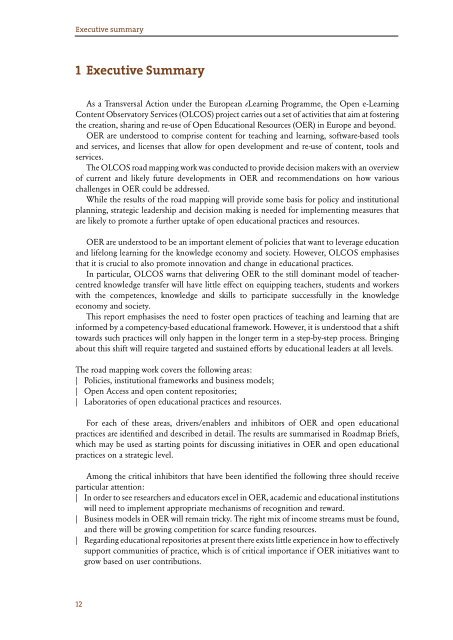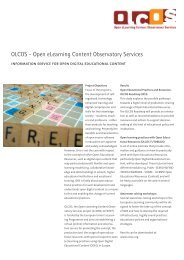Executive Summary (PDF) - OLCOS
Executive Summary (PDF) - OLCOS
Executive Summary (PDF) - OLCOS
You also want an ePaper? Increase the reach of your titles
YUMPU automatically turns print PDFs into web optimized ePapers that Google loves.
<strong>Executive</strong> summary<br />
1 <strong>Executive</strong> <strong>Summary</strong><br />
As a Transversal Action under the European eLearning Programme, the Open e-Learning<br />
Content Observatory Services (<strong>OLCOS</strong>) project carries out a set of activities that aim at fostering<br />
the creation, sharing and re-use of Open Educational Resources (OER) in Europe and beyond.<br />
OER are understood to comprise content for teaching and learning, software-based tools<br />
and services, and licenses that allow for open development and re-use of content, tools and<br />
services.<br />
The <strong>OLCOS</strong> road mapping work was conducted to provide decision makers with an overview<br />
of current and likely future developments in OER and recommendations on how various<br />
challenges in OER could be addressed.<br />
While the results of the road mapping will provide some basis for policy and institutional<br />
planning, strategic leadership and decision making is needed for implementing measures that<br />
are likely to promote a further uptake of open educational practices and resources.<br />
OER are understood to be an important element of policies that want to leverage education<br />
and lifelong learning for the knowledge economy and society. However, <strong>OLCOS</strong> emphasises<br />
that it is crucial to also promote innovation and change in educational practices.<br />
In particular, <strong>OLCOS</strong> warns that delivering OER to the still dominant model of teachercentred<br />
knowledge transfer will have little effect on equipping teachers, students and workers<br />
with the competences, knowledge and skills to participate successfully in the knowledge<br />
economy and society.<br />
This report emphasises the need to foster open practices of teaching and learning that are<br />
informed by a competency-based educational framework. However, it is understood that a shift<br />
towards such practices will only happen in the longer term in a step-by-step process. Bringing<br />
about this shift will require targeted and sustained efforts by educational leaders at all levels.<br />
The road mapping work covers the following areas:<br />
| Policies, institutional frameworks and business models;<br />
| Open Access and open content repositories;<br />
| Laboratories of open educational practices and resources.<br />
For each of these areas, drivers/enablers and inhibitors of OER and open educational<br />
practices are identified and described in detail. The results are summarised in Roadmap Briefs,<br />
which may be used as starting points for discussing initiatives in OER and open educational<br />
practices on a strategic level.<br />
Among the critical inhibitors that have been identified the following three should receive<br />
particular attention:<br />
| In order to see researchers and educators excel in OER, academic and educational institutions<br />
will need to implement appropriate mechanisms of recognition and reward.<br />
| Business models in OER will remain tricky. The right mix of income streams must be found,<br />
and there will be growing competition for scarce funding resources.<br />
| Regarding educational repositories at present there exists little experience in how to effectively<br />
support communities of practice, which is of critical importance if OER initiatives want to<br />
grow based on user contributions.<br />
12



